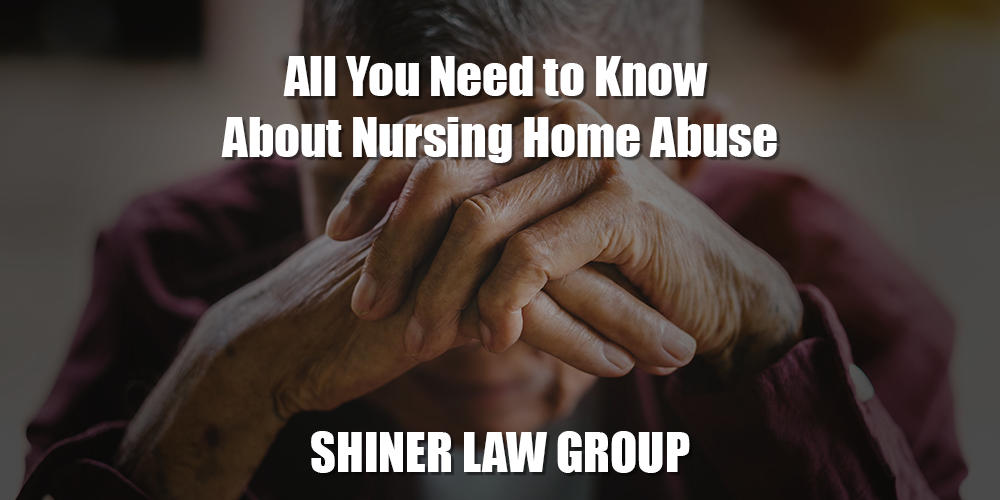Florida’s approximately 73,000 nursing home residents are protected by law from nursing home abuse. Florida Statutes Public Health 400.022 and Florida Statutes Social Welfare 429.28 prescribes more than 20 rights of nursing home residents.
A violation of any of those rights incurs stiff penalties, which can even result in up to 30 years in prison. Courts may also award millions of dollars in damages depending on the degree of abuse and trauma that the elderly faced while in the nursing home’s care.

Signs of Nursing Home Abuse
As such, if you are certain that any of your elderly loved ones have suffered nursing home abuse in Florida, contact a personal injury lawyer immediately. Having the help of a Florida personal injury lawyer is essential, especially given that the statute of limitations for nursing home abuse is only up to two years since the discovery of the abuse.
Litigating nursing home abuse can be tricky, as defendants may blame the elderly victims’ physical degradation on their advanced age and any pre-existing conditions. That being said, as the elderly’s next of kin, you are in the best position to determine where any of these seven signs are caused by nursing home abuse or not:
1. Bedsores
John Hopkins Medicine describes bedsores as “ulcers that happen on areas of the skin that are under pressure” for long periods. These usually occur when elderly patients are left on their beds or wheelchairs without adjusting their positions regularly.
Aside from the pain and discomfort that bedsores bring, they also compound other pre-existing conditions, like diabetes. Bedsores take a long time to heal, especially in the elderly, making their presence a very telling sign of neglect.
Bedsores often appear in the following areas:
- On the tailbone or hips;
- On the heels of the feet;
- On the shoulder blades;
- On the back of the head; or
- On the backs and sides of the knees.
With decreased mobility in many elderly patients, nursing homes have the responsibility to ensure that their patients are given enough attention to avoid such instances. The development of bedsores can indicate that a nursing home is understaffed or has poorly trained employees who aren’t equipped with the necessary skills to care for elderly patients.
2. Elopement
Understaffed nursing homes or those who employ untrained orderlies are often incapable of keeping track of all their patients all at once. This allows patients with mental conditions, such as Alzheimer’s disease or Dementia, to slip through unnoticed and unprepared for the weather.
These escapes are potentially deadly, as confused patients cut off from their medication may lose their bearings on the streets and meet accidents. They can experience dehydration, heat strokes, or other heat-induced conditions in an incredibly hot Florida summer.
Nursing homes are supposed to be safe havens for elderly patients who can no longer adequately care for themselves. As such, letting patients with mental conditions escape their facilities is a severe case of neglect for which they must be prosecuted.
3. Poor Personal Hygiene
Another tell-tale sign of nursing home neglect is poor personal hygiene. When an elderly suffers from any kind of mental or physical impairment, their ability to take care of personal hygiene is often the first thing to go. In many cases, the inability of family members to assist elderly patients in their basic hygiene needs drives the decision to put them in nursing homes in the first place.
In senior patients, signs of poor personal hygiene are unwashed hair, untrimmed nails, body odor, dirty clothes, and the smell of urine or feces. Poor personal hygiene among elderly patients means that the nursing home cannot give enough care for their patients.
4. Physical Injuries
Physical injuries are a sure sign of abuse, even if the patient has a history of harming themselves. Overworked and under trained staff may lash out at patients and physically harm them with excessive force. Improper use of restraints can also cause physical injuries—which is something to watch out for, particularly with mental patients.
Aside from that, unattended senior patients trying to do things for themselves may also suffer slip and fall injuries. These elderly patients, especially in their advancing age, would often have brittle bones and weak muscles, making a “simple fall” an exceedingly dangerous one—resulting in broken bones, concussions, or even possibly death.
Physical injuries are a grave cause of concern because they can directly contribute to the patient’s unwarranted passing.
5. Personality Changes
Everybody who goes through traumatic experiences undergoes personality changes. In elderly patients, a sudden change in personality—such as being reclusive when they used to be very friendly or sudden bouts of intense emotions within a short period of time—can be signs of physical, sexual, or emotional abuse.
If you notice unprompted personality and behavioral changes after being admitted to a nursing home, contact a medical specialist and your lawyer immediately!
6. Mental Degradation
Proving abuse through seemingly accelerated mental degradation can be challenging, especially if your loved one had mental conditions such as Alzheimer’s or Dementia when they were first admitted. That being said, if your loved one appears to be more confused than usual, it can be a sign that your loved one’s medication is not being monitored adequately.
As people age, a person’s body becomes more susceptible to diseases. As such, it’s common for elderly patients to be seeing multiple doctors and taking many prescriptions. The problem lies when a senior finds it too difficult to keep track of their medications―an issue that should have been solved with a knowledgeable nurse or aide.
However, if staff are untrained or overworked, they can neglect these carefully laid out medication schedules. Doing so can cause harmful effects such as mental degradation, particularly when dosages are not monitored carefully.
7. Malnutrition and Dehydration
Among the essential duties of a nursing home is to keep their elderly patients as healthy as possible through nutritious meals and ample hydration. If that simple duty is neglected, pre-existing medical conditions can worsen, and new ones may arise.
One of the most common forms of abuse is when these two basic needs are withheld as a disciplinary tactic. This unethical practice usually happens when a home’s staff lack training or are understaffed!
If your loved one looks uncharacteristically sickly, inactive, and appears to be losing weight, contact your personal injury lawyer immediately.
In Case of a Wrongful Death
Death comes to everybody at some point. However, if you suspect that your senior family member’s death was caused by nursing home abuse, you are within your rights to sue for damages.
In Florida, you can file a wrongful death claim against a responsible person or entity if you believed that their actions contributed mostly to your loved one’s untimely passing. With death involved, there are specific conditions that differentiate a wrongful death claim from a murder case.
Civil vs. Criminal Offense
Simply put, a wrongful death claim is a civil suit, while murder is a criminal offense. These are two significant distinctions to make, as the proceedings vary wildly in each case.
In a civil offense, defendants found guilty will not be punished through incarceration unless a criminal intent is revealed during the trial. Instead, the court will award damages to the plaintiffs, which will be paid by the defendant.
In a criminal offense such as murder, a losing defendant will face incarceration. Another important distinction is that plaintiffs file civil suits in their capacity as private individuals. A government prosecutor will file charges against the offender in a criminal case whether or not the victim’s family wants to get involved.
This is why one of the two names in a criminal case title is always a government entity. For example, in Florida v. Jardines, the plaintiff is the State of Florida. The same is true for United States v. Ruiz, where the plaintiff is the United States Supreme Court.
Negligence
Arguably, the most critical element of a wrongful death claim is the presence of negligence. For a wrongful death claim to succeed, plaintiffs must successfully prove that the nursing home’s attendants failed to do their duty—and consider this a breach of contract. Furthermore, this negligence in their actions should have directly caused the death of your loved one.
This contrasts with a murder case, where plaintiffs must prove that the defendant had an intent to kill that exceeds the definition of self-defense.
Burden of Proof
The burden of proof will always fall on the plaintiff, but the degree to which you must prove a defendant’s guilt varies between civil and criminal cases. In wrongful death claims, plaintiffs need only to establish that the defendant “more likely than not” committed the negligent actions that lead to a victim’s death.
Meanwhile, the burden of proof is much heavier in criminal cases, where plaintiffs must establish a defendant is guilty beyond a reasonable doubt.
Gathering evidence and establishing a motive can be difficult for nursing home abuse cases. With high-profile nursing home abuse cases in recent years, many establishments have since developed strategies to circumvent efforts to investigate them.
During inspections, it’s common practice for some nursing homes to temporarily hire additional staff, hide camera footage, or falsify documents to evade liability. For a nursing home abuse claim to succeed, you’ll want to hire a wrongful death lawyer in Florida with the necessary experience in dealing with this type of case.
Types of Damages to be Awarded in a Nursing Home Abuse Suit
While gathering evidence, you and your personal injury lawyer will also need to figure out which types of damages can apply to your case. There are two basic classifications of damages to claim in such cases: compensatory and punitive.
Compensatory damages are awarded by the court and paid by the defendant to compensate for the cost of recovery from the injuries and harm suffered by the victims. Provided that the victim is still living, compensatory damages are used to cover the expenses of procedures that aim to restore the victim to their previous state before they experienced nursing home abuse.
Meanwhile, punitive damages are awarded solely as punishment for particularly heinous crimes, in the hopes that the hefty fines will deter other people from perpetuating the same acts in the future.
Here are five types of damages that are commonly awarded to successful plaintiffs:
1. Medical Expenses
Any expenses incurred by the victim to recover from the abuse they suffered while in the care of a nursing home can and should be recovered. Such fees include any ongoing and past medical expenses for doctor’s visits, hospital stays, and aftercare.
Provided that competent medical professionals can establish it, any anticipated costs for future medical visits may also be compensated.
2. Physical Suffering
Nursing home abuse may manifest in physical injuries due to excessive force. Aside from medical expenses related to recovery, a presiding judge may award compensation for the physical suffering that an elderly patient suffered in the hands of erring aides, nurses, or orderlies.
3. Mental Anguish
Not all injuries are physical. Aside from the accompanying trauma that physical injuries bring, particularly abusive and unethical practices—such as withholding necessities like food and drink or prolonged isolation as a disciplinary tactic—can leave lasting mental suffering on elderly victims.
With their advanced age and pre-existing conditions, additional mental illnesses such as anxiety and trauma are likely to impact their health negatively.
4. Disfigurement
Heinous acts of physical violence towards senior patients can cause disfigurement. On top of medical expenses, physical suffering, and mental anguish, a personal injury lawyer may argue for damages based on disfigurement.
Juries can differentiate disfigurement from the other types of damages mentioned because it forms a lasting impact on someone’s life and may repeatedly trigger episodes of mental anguish.
5. Punitive Damages
As mentioned above, courts reserve punitive damages purely as a punishment for specifically grievous crimes. Given that most elderly patients who suffer from nursing home abuse are powerless to defend themselves, these cases can easily warrant punitive damages.
A skilled personal injury lawyer may show that the nursing home was aware of or made decisions that directly contributed to the victim’s abuse. Such choices include understaffing, hiring unqualified staff for lower pay, and neglecting to perform inspections to determine the quality of life in their nursing home.
The Bottom Line
Nobody deserves maltreatment, especially ailing seniors who need care and are powerless to defend themselves. A nursing home that fails to take care of its senior patients has no place in the healthcare industry. If you or someone you know is suffering from nursing home abuse, a personal injury lawyer will help you and your family get the compensation you deserve.
Are you looking for a personal injury lawyer to help handle cases regarding nursing home abuse? Shiner Law Group specializes in representing victims of nursing home abuse, wrongful death, personal injury, and other related cases. Our team of Florida Licensed attorneys is dedicated to helping victims get rightful compensation for their injuries. Get in touch with us today to find out more about how we can help you!

